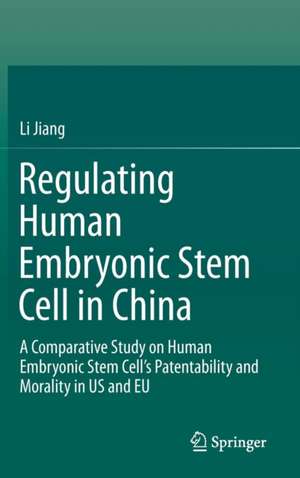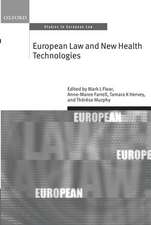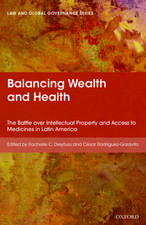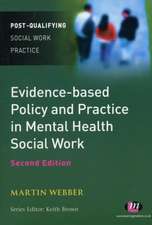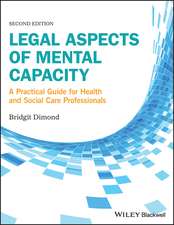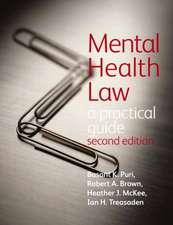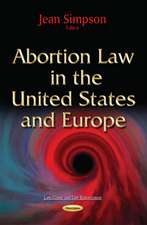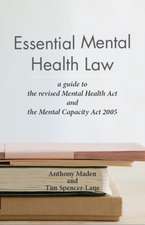Regulating Human Embryonic Stem Cell in China: A Comparative Study on Human Embryonic Stem Cell’s Patentability and Morality in US and EU
Autor Li Jiangen Limba Engleză Hardback – 11 aug 2016
The general scope of the book is the patentability and morality of human embryonic stem cell research in US, EU and China. The book observes fraudsters operate unsafe human embryonic stem cell therapies and officialdom turns a blind eye to the immoral human embryonic stem cell research in China. The book highlights that both patent control and federal funding control are inefficient and ineffective way to monitoring human embryonic stem cell research. The book finally proposed an approach for china to regulating human embryonic stem cell research-regulating research itself at the reconciled international regime.
The potential reader includes academics and practitioners dealing with intellectual property, patent law and stem cell inventions. The topic discussed will also be interesting to a broad readership, including experts, regulators, policy makers and medical researchers in both ethical and legal disciplines in the field of embryonicstem cell research.
| Toate formatele și edițiile | Preț | Express |
|---|---|---|
| Paperback (1) | 636.63 lei 43-57 zile | |
| Springer Nature Singapore – 12 iun 2018 | 636.63 lei 43-57 zile | |
| Hardback (1) | 643.00 lei 43-57 zile | |
| Springer Nature Singapore – 11 aug 2016 | 643.00 lei 43-57 zile |
Preț: 643.00 lei
Preț vechi: 756.47 lei
-15% Nou
Puncte Express: 965
Preț estimativ în valută:
123.07€ • 126.83$ • 103.90£
123.07€ • 126.83$ • 103.90£
Carte tipărită la comandă
Livrare economică 03-17 martie
Preluare comenzi: 021 569.72.76
Specificații
ISBN-13: 9789811021008
ISBN-10: 9811021007
Pagini: 304
Ilustrații: XVIII, 200 p. 2 illus.
Dimensiuni: 155 x 235 x 14 mm
Greutate: 0.49 kg
Ediția:1st ed. 2016
Editura: Springer Nature Singapore
Colecția Springer
Locul publicării:Singapore, Singapore
ISBN-10: 9811021007
Pagini: 304
Ilustrații: XVIII, 200 p. 2 illus.
Dimensiuni: 155 x 235 x 14 mm
Greutate: 0.49 kg
Ediția:1st ed. 2016
Editura: Springer Nature Singapore
Colecția Springer
Locul publicării:Singapore, Singapore
Cuprins
Values of Human Embryonic Stem Cell Research, the phenomenon of “Stem Cell Tourism” and Inadequate regulation of Human Embryonic Stem Cell in China.- The Moral Maze In Human Embryonic Stem Cell Research: the moral status of human embryo and the moral source of human embryonic stem cell.- China: inconsistent moral standards of human embryonic stem cell research between patent law and practical application.- The United States: Inconsistent policies on federal funding control of human embryonic stem cell research.- The European Union: Inconsistent interpretations of moral provisions in Patent Convention addressing human embryonic stem cell research.- A proposal for controlling human embryonic stem cell research in China: regulate research itself in a reconciled human embryonic stem cell regulation at the international regime.
Notă biografică
Li Jiang is currently a lecturer in Kenneth Wang School of Law, Soochow University. Born in China, Li Jiang was educated at Shandong University, China and graduated with a Bachelors degree in Biotechnology. Li Jiang gained her PhD degree at Bangor University Law School in 2014. Jiang’s research looks at the scope of patentability in respect of the application of the moral exclusion to human embryonic stem cell research through a comparative analysis of the diverging interpretations which have emerged in the regulations of US, EU and China. Many pieces of Jiang’s work have been published by leading international journals in Australia and the United States.
Textul de pe ultima copertă
The general scope of the book is the patentability and morality of human embryonic stem cell research in US, EU and China. The book observes fraudsters operate unsafe human embryonic stem cell therapies and officialdom turns a blind eye to the immoral human embryonic stem cell research in China. The book highlights that both patent control and federal control are inefficient and ineffective way to monitoring human embryonic stem cell research. The book finally proposed an approach for china to regulating human embryonic stem cell research-regulating research itself at the reconciled international regime.
The potential reader includes academics and practitioners dealing with intellectual property, patent law and stem cell inventions. The topic discussed will also be interesting to a broad readership, including experts, regulators, policy makers and medical researchers in both ethical and legal disciplines in the field of embryonic stem cell research.
Caracteristici
The first book to cover comprehensive analysis of the EU, US and China patent system as applied to Human Embryonic Stem Cell related Inventions Comparatively discusses the moral status of human embryo in the EU, US and China Observes “stem cell tourism” phenomenon in China and finds inconsistent moral standards between patent law and practical application in China Offers the regulatory governance of human embryonic stem cell research in China, setting out a feasible approach to monitoring stem cell research in China Draws lessons from EU harmonization of human embryonic stem cell related regulation, and considers the reconciliation of human embryonic stem cell regulation at the international level Includes supplementary material: sn.pub/extras
